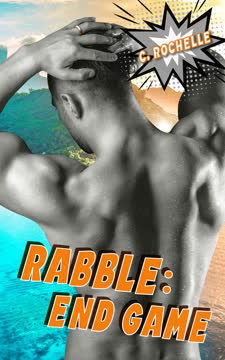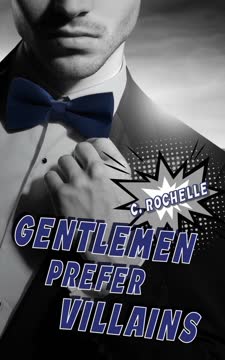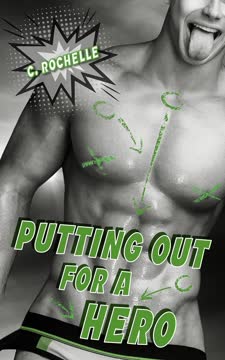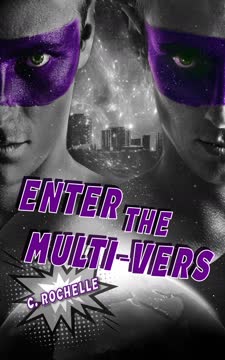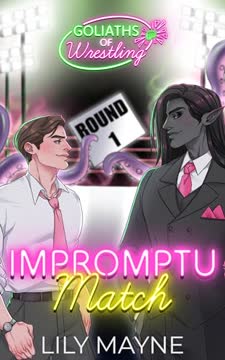Plot Summary
Corsets, Chat, and Chaos
Xander and Butch's wedding fitting is a riot of sexual tension, sibling rivalry, and group chat snark. Simon, the self-appointed fashion dictator, wrangles the clan while Xander and Butch flirt outrageously, their inventus bond making their thoughts and desires nearly public. The Rabble group chat is a constant background of ball-busting and inside jokes, setting the tone for a family that expresses love through relentless teasing. The arrival of Ziggy and Micah, the space-married couple, hints at deeper family drama and unresolved alien business. Beneath the banter, there's a sense of anticipation and vulnerability as the wedding approaches, with everyone's secrets and insecurities simmering just below the surface.
Lizard Grip and Secrets
Baltasar's anxiety about his changing body and relationship with Zion is palpable. He's developing lizard-like features, a side effect of his inventus bond, and fears rejection from his mate. Their dynamic is both playful and deeply intimate, with Zion's primal affection clashing with Baltasar's self-doubt. The chapter explores themes of body autonomy, shame, and the need for acceptance. Their sexual connection is a coping mechanism, but the underlying fear of not being "enough" or being "too much" for one's partner is universal. The humor and kink are a shield for real vulnerability, and the chapter ends with Baltasar still hiding his true fears, setting up a journey toward self-acceptance.
Brats, Bonds, and Boundaries
Andre, Gabriel, and Theo's throuple is a chaotic blend of dominance, brattiness, and deep-seated trauma. The twins' psychic bond is both a comfort and a curse, making privacy impossible and emotional boundaries blurry. Theo's antics—provocative, attention-seeking, and sometimes cruel—mask a desperate need for connection and forgiveness, especially regarding his estranged son, Ziggy. Andre's struggle to balance leadership, love, and discipline is mirrored in his interactions with both his partners and his siblings. The chapter delves into the pain of family betrayal, the longing for reconciliation, and the difficulty of communicating needs in a family where everyone is a little bit broken.
Guest Lists and Ghosts
Simon's obsession with control is tested by the unpredictable dynamics of his new, sprawling family. The guest list for the wedding becomes a battleground for old wounds and new alliances, especially with the looming presence of Ziggy and the unresolved tension with Theo. Simon's relationship with Wolfy is a rare source of stability, but even that is fraught with the fear of losing control. The chapter explores the pain of being an outsider, the longing for belonging, and the challenge of adapting to a family that is constantly in flux. The specter of past betrayals and the hope for future healing hang over every interaction.
Mommy Issues and Princesses
Violentia's tough exterior hides a deep need to nurture and be needed. Her growing feelings for Kai, the pregnant normie, are complicated by her own fears of losing control and hurting those she loves. The chapter explores the dynamics of caretaking as both a kink and a genuine emotional need, with Vi's desire to be "Mommy" to a "Princess" reflecting her struggle to reconcile her violent powers with her softer side. Kai's vulnerability and isolation as a surrogate in a superhuman world make her both a damsel and a quiet force, and their slow-burn connection is a rare source of hope and healing.
Space Daddy's Homecoming
Micah and Ziggy's return to Earth is both triumphant and fraught. Their relationship, forged in the crucible of space and danger, is tested by the Rabble's relentless teasing and the ever-present threat of old enemies. Ziggy's status as both a mercenary and a lost son creates tension with Simon and Theo, while Micah's inventive powers and open-heartedness make him a bridge between worlds. The chapter explores the challenges of being an outsider, the longing for acceptance, and the power of chosen family to heal old wounds.
Fried Chicken and Feelings
The rehearsal dinner is a microcosm of the Rabble's dysfunction and love. Fried chicken becomes a symbol of comfort and tradition, but beneath the surface, everyone is struggling with their own insecurities and resentments. Butch's anxiety about the wedding, Xander's guilt over neglecting Kai, and the simmering tensions between various couples all come to a head. The group chat is both a lifeline and a source of chaos, keeping everyone connected even as they drift apart. The chapter ends with a sense of foreboding, as the illusion of normalcy begins to crack.
Cyclones and Clan Leaders
A literal cyclone threatens the wedding, mirroring the emotional storms brewing within the family. Zion and Wolfy's uneasy alliance is tested as they navigate the politics of clan leadership and the legacy of parental abuse. The chapter explores the burden of leadership, the difficulty of trusting others, and the temptation to repeat the mistakes of the past. The storm becomes a metaphor for the chaos of family, and the need for compromise and vulnerability in order to survive.
Family, Fury, and Forgiveness
Zion's struggle to reconcile his love for his daughter with his anger at his family's betrayal is at the heart of this chapter. The legacy of abuse and manipulation by his parents is a wound that refuses to heal, and the temptation to seek vengeance is ever-present. The chapter explores the pain of watching loved ones self-destruct, the difficulty of breaking cycles of violence, and the possibility of finding peace through forgiveness rather than revenge. The theme of chosen family as salvation is reinforced, even as old wounds threaten to reopen.
Dinner, Drama, and Desire
The family dinner is a powder keg of unresolved tension, sexual frustration, and barely concealed resentment. The twins' psychic games, Theo's provocations, and the simmering attraction between Micah and Gabriel all threaten to explode. The chapter explores the difficulty of maintaining public facades while navigating private desires, the danger of secrets, and the power of vulnerability to both heal and harm. The dinner ends in chaos, setting the stage for the revelations and reckonings to come.
Besties, Baggage, and Banter
Kai's sense of isolation and loss of identity as a surrogate is brought to the fore, as her friendship with Xander is strained by his new relationship and the demands of the Rabble. Vi's caretaking offers a lifeline, but Kai's fear of being left behind is palpable. The chapter explores the pain of outgrowing old relationships, the challenge of finding new roles in a changing family, and the hope that comes from being truly seen and cared for.
Chaos Grenades and Confessions
Theo's penchant for chaos reaches new heights as he drops emotional and literal grenades into the family dynamic. Confessions of attraction, past betrayals, and hidden fears come to light, forcing everyone to confront uncomfortable truths. The chapter explores the cost of honesty, the danger of unchecked power, and the possibility of redemption through vulnerability and forgiveness.
Apologies, Crushes, and Collisions
The web of attraction between Micah, Gabriel, and Ziggy becomes impossible to ignore, as resonance—both literal and metaphorical—draws them together. The chapter explores the complexity of polyamorous and queer relationships, the challenge of navigating jealousy and desire, and the power of communication to transform confusion into connection. Apologies are offered and accepted, but the path to healing is messy and nonlinear.
Subplots, Submissives, and Surprises
The various couples and throuples navigate shifting power dynamics, exploring kink as both a source of pleasure and a way to negotiate agency and vulnerability. The chapter delves into the psychological underpinnings of dominance and submission, the importance of consent, and the healing potential of sexual exploration. Surprises—both welcome and unwelcome—abound, keeping everyone on their toes.
Slutty Science and Resonance
Micah's scientific curiosity becomes a metaphor for the family's quest to understand themselves and each other. The intersection of superpowers, alien biology, and human emotion is explored through both scientific inquiry and sexual experimentation. The chapter highlights the importance of curiosity, open-mindedness, and the willingness to embrace the unknown in the pursuit of connection and self-knowledge.
Daddy Issues and Decisions
The impending arrival of the next generation forces everyone to confront their own daddy issues and the legacy they want to leave behind. Decisions about family, leadership, and love are made in the crucible of crisis, with the threat of violence and betrayal ever-present. The chapter explores the courage required to break cycles of abuse, the importance of chosen family, and the hope that comes from forging a new path.
Princess Treatment and Power Plays
Kai and Vi's relationship reaches a turning point as they embrace their roles as Princess and Mommy, finding joy and healing in their dynamic. The power plays within the family—both sexual and political—are reframed as opportunities for growth and connection. The chapter celebrates the transformative power of being truly seen and claimed, and the freedom that comes from embracing one's desires.
Forgiveness, Family, and Freedom
The climax brings long-simmering conflicts to a head: betrayals are confronted, villains unmasked, and justice delivered. The family must reckon with the cost of their choices, the pain of the past, and the possibility of forgiveness. The wedding, once a symbol of chaos, becomes a celebration of survival, love, and the freedom to define family on one's own terms. The epilogue offers a glimpse of hope, healing, and the messy, beautiful future that awaits.
Characters
Xander Marin (Doctor Antihero)
Xander is the irreverent, quick-witted heart of the Rabble, wielding sarcasm and science with equal skill. His inventus bond with Butch is both a source of strength and vulnerability, exposing his deepest desires and insecurities. Xander's need for control masks a fear of abandonment, rooted in a childhood of rejection and trauma. His relationship with Butch is a journey from self-sabotage to self-acceptance, learning to trust in love and let others in. As a brother, he's both a chaos agent and a caretaker, using humor to defuse tension and protect those he loves. Xander's arc is one of growth, as he learns to balance independence with intimacy, and to claim happiness without apology.
Butch Hawthorne (Captain Masculine)
Butch is the archetypal himbo with a heart of gold, struggling to reconcile his public persona as a superhero with his private longing for love and acceptance. His inventus bond with Xander is transformative, allowing him to shed the armor of stoicism and embrace vulnerability. Butch's journey is marked by anxiety, self-doubt, and the fear of not being "enough," but also by immense courage and loyalty. His relationship with Xander is a safe haven, a place where he can be both strong and soft. As a brother and friend, Butch is supportive and self-effacing, often putting others' needs before his own. His arc is about claiming his right to happiness and redefining heroism on his own terms.
Baltasar Suarez
Baltasar is the embodiment of imposter syndrome, constantly questioning his worth and fearing rejection. His inventus bond with Zion triggers a physical transformation that mirrors his internal struggle, as he grapples with the fear of being "too much" or "not enough." Baltasar's humor and kink are coping mechanisms, masking deep-seated insecurities and a longing for unconditional love. His relationship with Zion is both a source of comfort and a crucible for growth, forcing him to confront his fears and embrace his true self. As a sibling, Baltasar is both the butt of jokes and the glue that holds the family together, his vulnerability making him relatable and beloved.
Zion Salah
Zion is a study in contrasts: a powerful supe with a kind heart, a leader shaped by trauma but determined to break the cycle of violence. His relationship with Baltasar is a safe space where he can be both dominant and nurturing, embracing his primal instincts without fear of rejection. Zion's struggle is with the legacy of parental abuse and the burden of leadership, torn between the desire for peace and the temptation for vengeance. His arc is about learning to trust, to accept help, and to define strength not as violence, but as vulnerability and compassion.
Simon Alarie-Suarez (La Main de Fer)
Simon is the iron fist in a velvet glove, wielding power with style and precision. His obsession with control is both a defense mechanism and a source of conflict, especially as he navigates the chaos of his new family. Simon's relationship with Wolfy is a rare source of softness, allowing him to let down his guard and embrace vulnerability. As a sibling and step-parent, Simon is both a terror and a caretaker, his sharp tongue hiding a deep well of love and loyalty. His arc is about learning to compromise, to trust others, and to find strength in connection rather than domination.
Wolfgang Suarez (The Hand of Death)
Wolfy is the archetypal clan leader, burdened by the weight of responsibility and the scars of childhood trauma. His power to drain others is both a weapon and a curse, isolating him even as he strives to protect his family. Wolfy's relationship with Simon is a lifeline, a place where he can be vulnerable and loved for who he is, not just what he can do. As a brother and mentor, Wolfy is both feared and revered, his stoicism masking a deep well of pain and longing. His arc is about learning to let go, to accept help, and to find peace in the midst of chaos.
Violentia Suarez
Vi is a force of nature, her violent powers at odds with her deep need to nurture and be nurtured. Her relationship with Kai is a journey of self-discovery, as she learns to balance dominance with tenderness and to embrace her softer side. Vi's struggle is with the fear of losing control and hurting those she loves, a legacy of trauma and abuse. As a sibling and friend, Vi is fiercely loyal, using humor and caretaking as shields against vulnerability. Her arc is about learning to forgive herself, to accept love, and to claim happiness without fear.
Kai
Kai is the outsider in a world of superhumans, her pregnancy both a blessing and a burden. Her friendship with Xander is tested by change and loss, while her relationship with Vi offers a lifeline of care and acceptance. Kai's struggle is with the loss of autonomy, the fear of being left behind, and the challenge of finding her place in a family that is both overwhelming and loving. Her arc is about reclaiming agency, embracing vulnerability, and finding joy in being seen and cherished for who she is.
Micah Salah (Exo-Tech)
Micah is the family's resident genius, using his inventive powers to solve problems and connect people. His relationship with Ziggy is a testament to the power of chosen family, as they navigate the challenges of being outsiders and the legacy of parental neglect. Micah's curiosity and kindness make him a bridge between worlds, both literally and metaphorically. His arc is about embracing his own worth, claiming his right to happiness, and using his gifts to heal rather than harm.
Ziggy Andromeda
Ziggy is both a weapon and a wounded child, his mercenary skills masking a deep longing for connection and acceptance. His relationship with Micah is transformative, allowing him to shed the armor of violence and embrace vulnerability. Ziggy's struggle is with the legacy of abandonment, the challenge of forgiveness, and the fear of being unworthy of love. His arc is about finding family, embracing his true self, and learning that strength comes from connection, not isolation.
Plot Devices
Multi-POV Chaos and Group Chat
The novel's structure is a kaleidoscope of voices, each chapter shifting perspective to reveal the inner lives and secrets of the Rabble. The omnipresent group chat is both a narrative device and a character in its own right, providing comic relief, exposition, and a sense of real-time intimacy. This multi-POV approach allows for deep psychological exploration, highlighting the ways in which family is both a source of pain and healing. The group chat's relentless banter and ball-busting serve as a love language, masking vulnerability and reinforcing bonds.
Inventus Bonds, Resonance, and Power-Sharing
The inventus bond and Stellarian resonance are central plot devices, serving as both literal superpowers and metaphors for the ways in which love, trauma, and desire bind people together. Power-sharing becomes a stand-in for emotional vulnerability, with characters forced to confront their deepest fears and needs in the crucible of connection. The bonds are both a source of strength and a site of conflict, highlighting the difficulty of maintaining autonomy within intimacy.
Family as Found and Forged
The novel interrogates the meaning of family, contrasting the pain of biological legacy with the hope of chosen bonds. Betrayal, forgiveness, and the struggle to break cycles of abuse are recurring themes, with characters forced to reckon with the cost of loyalty and the possibility of redemption. The wedding, with its forced proximity and high stakes, becomes a crucible for transformation, forcing everyone to confront their past and choose their future.
Kink, Consent, and Communication
The novel uses kink and sexual dynamics as both plot and character development tools, exploring the ways in which dominance, submission, and caretaking can be both healing and fraught. Consent is foregrounded, with characters negotiating boundaries, desires, and the meaning of agency within intimacy. The explicitness of the sexual content is balanced by a deep psychological realism, using sex as a lens to explore trauma, healing, and the search for self.
Foreshadowing, Red Herrings, and Mystery
The murder mystery at the heart of the wedding weekend is both a plot engine and a metaphor for the secrets and betrayals lurking within the family. Red herrings, misdirection, and foreshadowing keep the reader guessing, while the eventual unmasking of the true villain forces a reckoning with the cost of silence and complicity. The resolution is both cathartic and bittersweet, reinforcing the novel's central message: healing is possible, but only through honesty, vulnerability, and the willingness to change.
Analysis
Rabble: End Game is a riotous, deeply emotional exploration of found family, trauma, and the messy, beautiful work of healing. Through its kaleidoscopic structure and relentless humor, the novel interrogates the meaning of love, loyalty, and agency in a world where superpowers are both blessing and curse. The group chat, with its ball-busting and banter, becomes a metaphor for the ways in which families—biological or chosen—communicate love through shared language and ritual. The explicit sexual content is not gratuitous, but rather a vehicle for exploring the psychological realities of intimacy, consent, and the struggle for self-acceptance. The murder mystery and external threats serve as crucibles, forcing characters to confront their pasts and choose their futures. Ultimately, the novel's message is one of radical acceptance: that healing is possible, not through perfection, but through the willingness to be seen, to forgive, and to claim joy in the midst of chaos. In a world obsessed with heroism and villainy, Rabble: End Game insists that the true endgame is not victory, but connection.
Last updated:
Review Summary
Rabble: End Game received mostly positive reviews, with readers praising its chaotic and entertaining nature. Many appreciated the multiple POVs and character development, though some found the 13 perspectives overwhelming. Fans enjoyed the humor, spice, and plot twists, as well as the satisfying conclusion to the series. However, some readers expressed disappointment with certain character arcs and relationship developments. Overall, the book was well-received by fans of the series, who found it a fitting end to the Villainous Things world.
